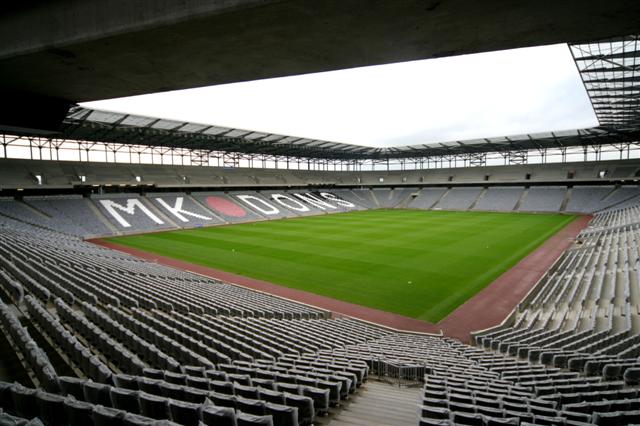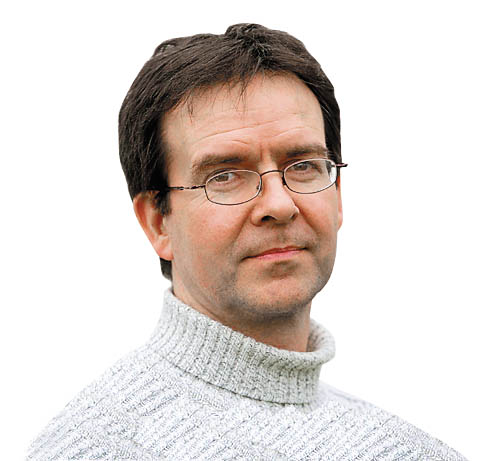The jury is now out on the question of which dozen-or-so of the 15 applicant English cities will be become potential hosts for the 2014 World Cup finals should England’s bid be successful – with a decision due on the 16th of this month.
Did I say cities? I meant cities and town. Because Milton Keynes, Buckinghamshire’s proud new town, is in with a shout alongside the big battalions.
Admittedly, MK could not match the fire power of the Newcastle/Gateshead team when final bids were officially delivered to Wembley Stadium last week.
While the latter were able to summon support from Paul Gascoigne, Alan Shearer, Peter Beardsley and David Ginola, the Buckinghamshire team are working with a more eclectic support network which includes film producer Lord Puttnam, based in MK as chancellor of the Open University, Lord Kinnock, Dan Magness – the MK resident who recently broke the world keepy-uppy record by keeping a ball off the ground for 24 hours – and Captain Jack.
Captain Jack. You know. The dastardly pirate who has entertained thousands of children this year in his ‘shipwreck’ on the ‘beach’ at the town’s Middleton Hall.
Most football folk will believe the MK bid is also heading for the rocks. But there is a chance that it might just bring off an audacious bit of piracy by commandeering a piece of the World Cup. After all, previous World Cup finals have included apparently unlikely hosts. Could MK be the Montpellier of 2014?
If that should come to pass, it would be thanks to the vision – crazed or inspired, depending on where you are standing – of music producer Pete Winkelman. He it was who conceived the notion of moving the carcass of Wimbledon FC to Buckinghamshire and recovering it as MK Dons. Now that was an enterprising piece of piracy if ever there was one.
And he it was who followed through on his ambition to relocate said Dons from their low-key home at the National Hockey Stadium to the spaceship-like construction that now sits alongside Ikea and Asda in the MK suburb of Denbigh – stadium:mk.
One of the key messages passed on by the England 2018 inspection team during its two rounds of visits to prospective bidders, in July and September, has been for them to make the most of their selling points – points which they may take for granted because they are so familiar.
This is surely advice which was least useful in Milton Keynes, where the bid team have been busy extolling the virtues of a “young, adaptable and vibrant new town that is a shining example to modern Britain.”

Shining examples are all very well - but MK can also show a shining new stadium and a plan to spend an additional £20 million to increase the capacity from its present level of just over 22,000 to 43,000, thus meeting Fifa’s World Cup requirements.
Working on the principle followed by Kevin Costner in the film Field of Dreams, where the main character constructs a baseball diamond amid Iowa wheatfields on the effective basis of “if you build it, they will come”, Winkelman has made his own vision reality.
And it is a reality that dazzles.
Shortly before the stadium opened in 2007 I was given a tour around it by the then manager of MK Dons, Martin Allen.
Now Allen’s, shall we say, forceful manner as a midfielder for Queen’s Park Rangers and West Ham earned him the nickname of Mad Dog. (Which he told me he hates. So sorry to bring it up again, Martin…)
I was, I admit, a little wary about meeting the uncompromising character whom I had previously observed from the safe distance of a press box.
Allen surprised me. Partly by his courtesy. But more than anything by his fervour on the subject of stadium:mk.
Initially reluctant to respond to Winkelman’s offer of taking up managership of MK Dons, Allen was drawn towards the prospect after coming to see the stadium for himself. Two things in particular, he said, had persuaded him.
“Look at the walls,” he said to me as we stood high in the almost completed stands. The walls were dark – and glossy.
”Black granite,” he said, “all the way from China. Look at it. It’s like what you’ve got in your kitchen. Imagine how much all of that costs.”
And after stepping forward to survey the sweep of the stadium’s bowl, with its playing surface established well below outside ground level, he extolled a design that had taken Winkelman’s eye after he had visited Barcelona’s Nou Camp stadium.
A few minutes later, standing in a home dressing room that had underfloor heating – although no soundproofing, which must have proved a drawback given the fondness both Allen and his eventual successor Paul Ince have for loud words of encouragement – there was another rousing vote of confidence in the MK project.
Allen insisted he would only sign players once they had had the opportunity to come and see the stadium for themselves. “Otherwise,” he said, “it’s like telling someone about your holidays. Who cares about it? Unless you were actually there yourself and felt the moments of magic, it’s boring. Don’t bother about it.
“But once you have actually come here and seen this stadium, and what it is going to be, you can’t not be enthusiastic about it. This is something from a completely different era.”
Will the England 2018 decision-makers share Allen’s belief? It may not be probable, but it’s distinctly possible.
Mike Rowbottom, one of Britain’s most talented sportswriters, has covered the last five Summer and four Winter Olympics for The Independent. Previously he has worked for the Daily Mail, The Times, The Observer, the Sunday Correspondent and The Guardian. He is now chief feature writer for insidethegames.

